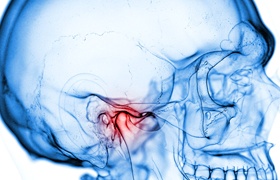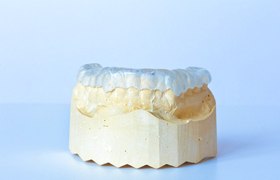TMJ & Bruxism – New Bedford, MA
TMJ is More Common Than You Think
What Causes TMJ Disorder?

The temporomandibular joints are located on either side of your jaw and connect it to your skull. Because these joints control your jaw movement, they can become inflamed for many reasons, resulting in pain throughout the face, neck, head, and other facial structures. The most common cause of TMJ Disorder is bruxism, which is the grinding or clenching of your teeth. This can not only wear down your tooth enamel, but it can place pressure on your temporomandibular joints as well.
Other potential causes of TMJ Disorder include:
- Arthritis in the temporomandibular joints
- Facial trauma
- Improper alignment of the jaw or teeth
- Inflammation in the muscles around the temporomandibular joints
Symptoms of TMJ Disorder

Although pain is the most prominent symptom of TMJ Disorder, there are many others that you may not suspect. Should you notice any of the following signs, make sure to contact our office and schedule an appointment for potential treatment:
- Frequent headaches or earaches
- Pain throughout the jaw when attempting to eat
- Difficulty opening and closing your mouth
- Changes in your bite
- The jaw makes clicking or popping noise
- Ringing in your ears
How TMJ is Treated

If you find that your jaw feels stiff and is difficult to move, scheduling a consultation with our team can put you on the right path to better oral and overall health. After a thorough examination of your facial structures, we can identify if TMJ Disorder is the problem. If so, we can create a customized, therapeutic mouthpiece that will help to rebalance your bite as well as use Botox to reduce the severity of your muscle spasms, all while improving the functionality of your jaw joints and minimizing pain.
The mouthpiece can be worn at night while you sleep to protect your teeth and keep them from grinding against each other while reducing the amount of pressure placed on your jaw joints to minimize the symptoms associated with TMJ.
What is Bruxism?

Bruxism is a common condition that causes you to grind or clench your teeth. Although you may unknowingly clench while you are awake, it is more likely that you will perform these actions while asleep. Unless you know the signs of bruxism or have someone who can tell you if you are doing it, you may not realize you suffer from bruxism.
Often caused by stress, anxiety, frustration, or tension, it can also simply be a bad habit that has formed over the years.
The most common symptoms associated with bruxism include:
- Pain throughout your face, neck, and jaw
- Interrupted sleep
- Worn tooth enamel that causes teeth to appear flat or chipped
- Tooth sensitivity
- Locked jaw
- Earaches
How to Alleviate TMJ Symptoms at Home

While you are seeking professional help for your TMJ Disorder and bruxism, it can also be helpful, in combination with an oral appliance and Botox, to practice certain at-home exercises that will strengthen and stretch your jaw muscles.
You might also try eating softer foods or taking smaller bites for a while to help reduce the amount of pressure placed on your jaw joints. You can also:
- Discover ways to alleviate stress. This can be accomplished through meditation, exercise, talking to a counselor, practicing controlled breathing, or even taking a long bath.
- Using a cold or heat pack to relax the jaw and facial muscles.
- Minimizing the act of yawning or yelling to avoid straining your temporomandibular joints.

